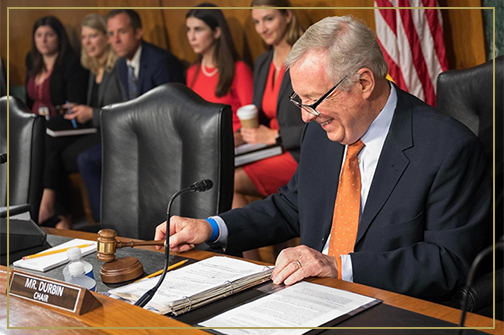The U.S. Senate Judiciary Committee held a hearing last month with executives of college athletics to discuss the pressing need for a universal agreement to regulate name, image, and likeness (NIL) policies that will include a national standard to avoid mixed messages with state laws.
To date, 32 states have laws designating student-athletes in high school and college to profit from their name, image, and personal brand. Student-athletes are also able to profit from affiliations, partnerships, merchandise, autographs, and more because of NIL laws.
“The first year that student-athletes had the ability to take advantage of NIL, I was able to get iPads for my younger siblings as Christmas gifts,” said Trinity Thomas, a former University of Florida student athlete, at the Oct. 17 hearing. “Kids gymnastics camps had the ability to promote the fact that I would be coming to work with them, I worked with companies to support women’s sports, and more.”
While Thomas was successful with NIL, she understands it’s not the same for everyone. Institutions and student-athletes face inconsistency and confusion due to the patchwork of state laws.
“There currently is no single standard that applies to all student-athletes in all sports, which oftentimes leaves us confused,” Thomas said. “In some cases, the different laws also place certain student-athletes at a disadvantage depending on where they go to school.”
For instance, an athlete attending a school in Utah that has restrictive NIL regulations may find it challenging to capitalize on their image and likeness compared to a counterpart such as California with more permissive rules.
Another limitation arises from the influence of university athletic departments. Some institutions may exert control over the endorsement deals athletes pursue, leading to potential conflicts of interest or favoritism.
This lack of autonomy can hinder student-athletes’ ability to make independent decisions about their personal brand and endorsements, contributing to disparities in their NIL experiences.
Among the highest earners of NIL are University of Southern California’s star point and shooting guard, Bronny James with $6.1 million, followed by $4.1 million for the University of Colorado’s quarterback, Shedeur Sanders, and Louisiana State University gymnast, Livvy Dunne, with $3.2 million, according to Yahoo Sports.
Sen. Richard Blumenthal of Connecticut introduced legislation to Congress in July to establish a unified national NIL standard. Blumenthal, a Democrat, made it clear that a “strong national standard” is essential and must be enforceable.
Tony Petitti, commissioner of the Big Ten Conference, Jack Swarbrick, vice president ,and James E. Rohr, director of athletics at the University of Notre Dame, and Charlie Baker, president of the National Collegiate Athletic Association (NCAA) were witnesses for the hearing. They agree with Blumenthal to create a universal law to promptly rectify conflicts in state laws and ensure the protection of student athletes’ health and well-being.
Republican Sen. Tommy Tuberville of Alabama and Democrat Sen. Joe Manchin III of West Virginia also introduced in July the “Protecting Athletes, School, and Sports (PASS) Act of 2023,” ensuring a consistent NIL standard and the desired protection.
“Our legislation…will set basic rules nationwide, protect our student-athletes, and keep NIL activities from ending college sports as we know it,” Tuberville, a former football coach at Auburn University, said in a press release.
The PASS Act received the endorsement of Baker.
Republican Sen. John Kennedy of Louisiana, told Baker that he “may regret asking Congress to intervene here.”
“All of a sudden, you’re going to be micromanaged,” Kennedy said.
Another issue of NIL is the classification of student-athletes as “employees,” Baker said. Under NIL this could have wide-ranging consequences, particularly for international students who are prohibited from working off-campus except for extreme economic circumstances.
Sen. Lindsey Graham of South Carolina asked Baker about the impact on Division II schools of the NCAA that includes schools with smaller and lesser-funded athletic programs in comparison to Division I.
“I think it’s pretty clear that Division II and Division III schools would get out of the interscholastic collegiate sports business,” Baker said.
In turn, Swarbrick stated that not classifying student athletes as employees preserves their admission and learning standards.
“The first thing we really need to have more than anything, is some form of transparency around what people are actually getting,” Baker said.


